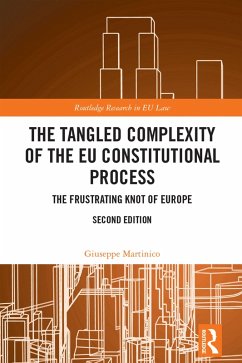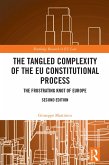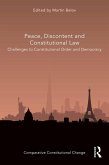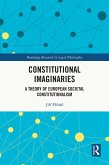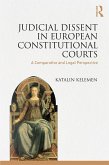Giuseppe Martinico
The Tangled Complexity of the EU Constitutional Process (eBook, PDF)
The Frustrating Knot of Europe
41,95 €
41,95 €
inkl. MwSt.
Sofort per Download lieferbar

21 °P sammeln
41,95 €
Als Download kaufen

41,95 €
inkl. MwSt.
Sofort per Download lieferbar

21 °P sammeln
Jetzt verschenken
Alle Infos zum eBook verschenken
41,95 €
inkl. MwSt.
Sofort per Download lieferbar
Alle Infos zum eBook verschenken

21 °P sammeln
Giuseppe Martinico
The Tangled Complexity of the EU Constitutional Process (eBook, PDF)
The Frustrating Knot of Europe
- Format: PDF
- Merkliste
- Auf die Merkliste
- Bewerten Bewerten
- Teilen
- Produkt teilen
- Produkterinnerung
- Produkterinnerung

Bitte loggen Sie sich zunächst in Ihr Kundenkonto ein oder registrieren Sie sich bei
bücher.de, um das eBook-Abo tolino select nutzen zu können.
Hier können Sie sich einloggen
Hier können Sie sich einloggen
Sie sind bereits eingeloggt. Klicken Sie auf 2. tolino select Abo, um fortzufahren.

Bitte loggen Sie sich zunächst in Ihr Kundenkonto ein oder registrieren Sie sich bei bücher.de, um das eBook-Abo tolino select nutzen zu können.
Offering a fresh view on the EU constitutionalisation process, the new edition of The Tangled Complexity of The EU Constitutional Process presents three main points: the idea of constitutional complexity, the tension between constitutional evolutionism and constitutional constructivism in the process of European integration.
- Geräte: PC
- mit Kopierschutz
- eBook Hilfe
Andere Kunden interessierten sich auch für
![The Tangled Complexity of the EU Constitutional Process (eBook, ePUB) The Tangled Complexity of the EU Constitutional Process (eBook, ePUB)]() Giuseppe MartinicoThe Tangled Complexity of the EU Constitutional Process (eBook, ePUB)41,95 €
Giuseppe MartinicoThe Tangled Complexity of the EU Constitutional Process (eBook, ePUB)41,95 €![Peace, Discontent and Constitutional Law (eBook, PDF) Peace, Discontent and Constitutional Law (eBook, PDF)]() Peace, Discontent and Constitutional Law (eBook, PDF)39,95 €
Peace, Discontent and Constitutional Law (eBook, PDF)39,95 €![Central and Eastern Europe After Transition (eBook, PDF) Central and Eastern Europe After Transition (eBook, PDF)]() Wojciech SadurskiCentral and Eastern Europe After Transition (eBook, PDF)51,95 €
Wojciech SadurskiCentral and Eastern Europe After Transition (eBook, PDF)51,95 €![Constitutional Imaginaries (eBook, PDF) Constitutional Imaginaries (eBook, PDF)]() Jirí PribánConstitutional Imaginaries (eBook, PDF)43,95 €
Jirí PribánConstitutional Imaginaries (eBook, PDF)43,95 €![Judicial Dissent in European Constitutional Courts (eBook, PDF) Judicial Dissent in European Constitutional Courts (eBook, PDF)]() Katalin KelemenJudicial Dissent in European Constitutional Courts (eBook, PDF)41,95 €
Katalin KelemenJudicial Dissent in European Constitutional Courts (eBook, PDF)41,95 €![The Insider's Guide to Legal Skills (eBook, PDF) The Insider's Guide to Legal Skills (eBook, PDF)]() Emily AllbonThe Insider's Guide to Legal Skills (eBook, PDF)35,95 €
Emily AllbonThe Insider's Guide to Legal Skills (eBook, PDF)35,95 €![Public Services and EU Competition Law (eBook, PDF) Public Services and EU Competition Law (eBook, PDF)]() Daniele GalloPublic Services and EU Competition Law (eBook, PDF)43,95 €
Daniele GalloPublic Services and EU Competition Law (eBook, PDF)43,95 €-
-
-
Offering a fresh view on the EU constitutionalisation process, the new edition of The Tangled Complexity of The EU Constitutional Process presents three main points: the idea of constitutional complexity, the tension between constitutional evolutionism and constitutional constructivism in the process of European integration.
Dieser Download kann aus rechtlichen Gründen nur mit Rechnungsadresse in A, B, BG, CY, CZ, D, DK, EW, E, FIN, F, GR, HR, H, IRL, I, LT, L, LR, M, NL, PL, P, R, S, SLO, SK ausgeliefert werden.
Produktdetails
- Produktdetails
- Verlag: Taylor & Francis eBooks
- Seitenzahl: 238
- Erscheinungstermin: 5. August 2022
- Englisch
- ISBN-13: 9781000630671
- Artikelnr.: 64123755
- Verlag: Taylor & Francis eBooks
- Seitenzahl: 238
- Erscheinungstermin: 5. August 2022
- Englisch
- ISBN-13: 9781000630671
- Artikelnr.: 64123755
- Herstellerkennzeichnung Die Herstellerinformationen sind derzeit nicht verfügbar.
Giuseppe Martinico is Full Professor of Comparative Constitutional Law at the Scuola Superiore Sant'Anna, Pisa.
Preface to the second edition: Why a new edition?
Preface and acknowledgements to the first edition
1 Only a drop in the ocean? An attempt to classify the debate about the
notion and the nature of the European Constitution
1.1 Introductory remarks
1.2 When concepts matter: what do we mean by 'constitutionalisation',
'constitution' and 'constitutionalism' at EU level?
1.3 Dealing with the literature: what about the 'efficient secret' of the
European Constitution? Some attempts at classification
1.4 The persistent terminological ambiguity with reference to European
constitutional law
1.5 Concluding on fundamental rights in EU law
1.6 Final remarks
2 Dealing with constitutional theories of European integration
2.1 Plan of the chapter
2.2 Multilevel constitutionalism
2.3 Constitutional pluralism
2.4 Complexity as 'the efficient secret' of the European Constitution
2.5 From complexity to constitutional synallagma: some examples
2.6 The idea of a complex 'order'
3 Constructivism, evolutionism and (mega) constitutional politics in the EU
from 1992 to 2010
3.1 Plan of the chapter
3.2 Constitutional constructivism versus constitutional evolutionism
3.3 The discontents of European constitutionalism and their relations with
constitutional constructivism
3.4 The (attempted) hijack of the acquis communautaire
3.5 The Maastricht Treaty as a turning point in the relationship between
the ECJ and national governments
3.6 Pupino: a frustrated attempt to limit the interpreter?
3.7 The season of the conventions and its products
3.8 Article 4.2 TEU as the apex of a constitutional crescendo
3.9 The Charter of Fundamental Rights of the EU
3.10 Final remarks
4 The multiple crises of the European Union (2011-2021)
4.1 An existential crisis
4.2 The impact over the EU constitutional system and the reaction to the
pandemic
4.3 Why the European Union is not (only) an ordoliberal entity
5 Complexity in action: from the structure to the actors
5.1 Plan of the chapter
5.2 Multiple loyalties and complexity in action: how hard it is being a
judge in a complex legal order
5.3 The idea of constitutional conflicts as a direct consequence of the
constitutional complexity of the EU
5.4 Back to case law: a possible typology of constitutional conflicts
5.5 Conflicts by convergence as one of the unexpected consequences of the
constitutionalisation of the EU
5.6 The importance of a consistent interpretation as a technique for
recognising fully fledged 'conflicts'
6 On the future of constitutional conflicts
6.1 On European monstrosity
6.2 Pushing the incoming tide back? Some notes on Brexit
6.3 Past and future of constitutional conflicts
Index
Preface and acknowledgements to the first edition
1 Only a drop in the ocean? An attempt to classify the debate about the
notion and the nature of the European Constitution
1.1 Introductory remarks
1.2 When concepts matter: what do we mean by 'constitutionalisation',
'constitution' and 'constitutionalism' at EU level?
1.3 Dealing with the literature: what about the 'efficient secret' of the
European Constitution? Some attempts at classification
1.4 The persistent terminological ambiguity with reference to European
constitutional law
1.5 Concluding on fundamental rights in EU law
1.6 Final remarks
2 Dealing with constitutional theories of European integration
2.1 Plan of the chapter
2.2 Multilevel constitutionalism
2.3 Constitutional pluralism
2.4 Complexity as 'the efficient secret' of the European Constitution
2.5 From complexity to constitutional synallagma: some examples
2.6 The idea of a complex 'order'
3 Constructivism, evolutionism and (mega) constitutional politics in the EU
from 1992 to 2010
3.1 Plan of the chapter
3.2 Constitutional constructivism versus constitutional evolutionism
3.3 The discontents of European constitutionalism and their relations with
constitutional constructivism
3.4 The (attempted) hijack of the acquis communautaire
3.5 The Maastricht Treaty as a turning point in the relationship between
the ECJ and national governments
3.6 Pupino: a frustrated attempt to limit the interpreter?
3.7 The season of the conventions and its products
3.8 Article 4.2 TEU as the apex of a constitutional crescendo
3.9 The Charter of Fundamental Rights of the EU
3.10 Final remarks
4 The multiple crises of the European Union (2011-2021)
4.1 An existential crisis
4.2 The impact over the EU constitutional system and the reaction to the
pandemic
4.3 Why the European Union is not (only) an ordoliberal entity
5 Complexity in action: from the structure to the actors
5.1 Plan of the chapter
5.2 Multiple loyalties and complexity in action: how hard it is being a
judge in a complex legal order
5.3 The idea of constitutional conflicts as a direct consequence of the
constitutional complexity of the EU
5.4 Back to case law: a possible typology of constitutional conflicts
5.5 Conflicts by convergence as one of the unexpected consequences of the
constitutionalisation of the EU
5.6 The importance of a consistent interpretation as a technique for
recognising fully fledged 'conflicts'
6 On the future of constitutional conflicts
6.1 On European monstrosity
6.2 Pushing the incoming tide back? Some notes on Brexit
6.3 Past and future of constitutional conflicts
Index
Preface to the second edition: Why a new edition?
Preface and acknowledgements to the first edition
1 Only a drop in the ocean? An attempt to classify the debate about the notion and the nature of the European Constitution
1.1 Introductory remarks
1.2 When concepts matter: what do we mean by 'constitutionalisation', 'constitution' and 'constitutionalism' at EU level?
1.3 Dealing with the literature: what about the 'efficient secret' of the European Constitution? Some attempts at classification
1.4 The persistent terminological ambiguity with reference to European constitutional law
1.5 Concluding on fundamental rights in EU law
1.6 Final remarks
2 Dealing with constitutional theories of European integration
2.1 Plan of the chapter
2.2 Multilevel constitutionalism
2.3 Constitutional pluralism
2.4 Complexity as 'the efficient secret' of the European Constitution
2.5 From complexity to constitutional synallagma: some examples
2.6 The idea of a complex 'order'
3 Constructivism, evolutionism and (mega) constitutional politics in the EU from 1992 to 2010
3.1 Plan of the chapter
3.2 Constitutional constructivism versus constitutional evolutionism
3.3 The discontents of European constitutionalism and their relations with constitutional constructivism
3.4 The (attempted) hijack of the acquis communautaire
3.5 The Maastricht Treaty as a turning point in the relationship between the ECJ and national governments
3.6 Pupino: a frustrated attempt to limit the interpreter?
3.7 The season of the conventions and its products
3.8 Article 4.2 TEU as the apex of a constitutional crescendo
3.9 The Charter of Fundamental Rights of the EU
3.10 Final remarks
4 The multiple crises of the European Union (2011-2021)
4.1 An existential crisis
4.2 The impact over the EU constitutional system and the reaction to the pandemic
4.3 Why the European Union is not (only) an ordoliberal entity
5 Complexity in action: from the structure to the actors
5.1 Plan of the chapter
5.2 Multiple loyalties and complexity in action: how hard it is being a judge in a complex legal order
5.3 The idea of constitutional conflicts as a direct consequence of the constitutional complexity of the EU
5.4 Back to case law: a possible typology of constitutional conflicts
5.5 Conflicts by convergence as one of the unexpected consequences of the constitutionalisation of the EU
5.6 The importance of a consistent interpretation as a technique for recognising fully fledged 'conflicts'
6 On the future of constitutional conflicts
6.1 On European monstrosity
6.2 Pushing the incoming tide back? Some notes on Brexit
6.3 Past and future of constitutional conflicts
Index
Preface to the second edition: Why a new edition?
Preface and acknowledgements to the first edition
1 Only a drop in the ocean? An attempt to classify the debate about the
notion and the nature of the European Constitution
1.1 Introductory remarks
1.2 When concepts matter: what do we mean by 'constitutionalisation',
'constitution' and 'constitutionalism' at EU level?
1.3 Dealing with the literature: what about the 'efficient secret' of the
European Constitution? Some attempts at classification
1.4 The persistent terminological ambiguity with reference to European
constitutional law
1.5 Concluding on fundamental rights in EU law
1.6 Final remarks
2 Dealing with constitutional theories of European integration
2.1 Plan of the chapter
2.2 Multilevel constitutionalism
2.3 Constitutional pluralism
2.4 Complexity as 'the efficient secret' of the European Constitution
2.5 From complexity to constitutional synallagma: some examples
2.6 The idea of a complex 'order'
3 Constructivism, evolutionism and (mega) constitutional politics in the EU
from 1992 to 2010
3.1 Plan of the chapter
3.2 Constitutional constructivism versus constitutional evolutionism
3.3 The discontents of European constitutionalism and their relations with
constitutional constructivism
3.4 The (attempted) hijack of the acquis communautaire
3.5 The Maastricht Treaty as a turning point in the relationship between
the ECJ and national governments
3.6 Pupino: a frustrated attempt to limit the interpreter?
3.7 The season of the conventions and its products
3.8 Article 4.2 TEU as the apex of a constitutional crescendo
3.9 The Charter of Fundamental Rights of the EU
3.10 Final remarks
4 The multiple crises of the European Union (2011-2021)
4.1 An existential crisis
4.2 The impact over the EU constitutional system and the reaction to the
pandemic
4.3 Why the European Union is not (only) an ordoliberal entity
5 Complexity in action: from the structure to the actors
5.1 Plan of the chapter
5.2 Multiple loyalties and complexity in action: how hard it is being a
judge in a complex legal order
5.3 The idea of constitutional conflicts as a direct consequence of the
constitutional complexity of the EU
5.4 Back to case law: a possible typology of constitutional conflicts
5.5 Conflicts by convergence as one of the unexpected consequences of the
constitutionalisation of the EU
5.6 The importance of a consistent interpretation as a technique for
recognising fully fledged 'conflicts'
6 On the future of constitutional conflicts
6.1 On European monstrosity
6.2 Pushing the incoming tide back? Some notes on Brexit
6.3 Past and future of constitutional conflicts
Index
Preface and acknowledgements to the first edition
1 Only a drop in the ocean? An attempt to classify the debate about the
notion and the nature of the European Constitution
1.1 Introductory remarks
1.2 When concepts matter: what do we mean by 'constitutionalisation',
'constitution' and 'constitutionalism' at EU level?
1.3 Dealing with the literature: what about the 'efficient secret' of the
European Constitution? Some attempts at classification
1.4 The persistent terminological ambiguity with reference to European
constitutional law
1.5 Concluding on fundamental rights in EU law
1.6 Final remarks
2 Dealing with constitutional theories of European integration
2.1 Plan of the chapter
2.2 Multilevel constitutionalism
2.3 Constitutional pluralism
2.4 Complexity as 'the efficient secret' of the European Constitution
2.5 From complexity to constitutional synallagma: some examples
2.6 The idea of a complex 'order'
3 Constructivism, evolutionism and (mega) constitutional politics in the EU
from 1992 to 2010
3.1 Plan of the chapter
3.2 Constitutional constructivism versus constitutional evolutionism
3.3 The discontents of European constitutionalism and their relations with
constitutional constructivism
3.4 The (attempted) hijack of the acquis communautaire
3.5 The Maastricht Treaty as a turning point in the relationship between
the ECJ and national governments
3.6 Pupino: a frustrated attempt to limit the interpreter?
3.7 The season of the conventions and its products
3.8 Article 4.2 TEU as the apex of a constitutional crescendo
3.9 The Charter of Fundamental Rights of the EU
3.10 Final remarks
4 The multiple crises of the European Union (2011-2021)
4.1 An existential crisis
4.2 The impact over the EU constitutional system and the reaction to the
pandemic
4.3 Why the European Union is not (only) an ordoliberal entity
5 Complexity in action: from the structure to the actors
5.1 Plan of the chapter
5.2 Multiple loyalties and complexity in action: how hard it is being a
judge in a complex legal order
5.3 The idea of constitutional conflicts as a direct consequence of the
constitutional complexity of the EU
5.4 Back to case law: a possible typology of constitutional conflicts
5.5 Conflicts by convergence as one of the unexpected consequences of the
constitutionalisation of the EU
5.6 The importance of a consistent interpretation as a technique for
recognising fully fledged 'conflicts'
6 On the future of constitutional conflicts
6.1 On European monstrosity
6.2 Pushing the incoming tide back? Some notes on Brexit
6.3 Past and future of constitutional conflicts
Index
Preface to the second edition: Why a new edition?
Preface and acknowledgements to the first edition
1 Only a drop in the ocean? An attempt to classify the debate about the notion and the nature of the European Constitution
1.1 Introductory remarks
1.2 When concepts matter: what do we mean by 'constitutionalisation', 'constitution' and 'constitutionalism' at EU level?
1.3 Dealing with the literature: what about the 'efficient secret' of the European Constitution? Some attempts at classification
1.4 The persistent terminological ambiguity with reference to European constitutional law
1.5 Concluding on fundamental rights in EU law
1.6 Final remarks
2 Dealing with constitutional theories of European integration
2.1 Plan of the chapter
2.2 Multilevel constitutionalism
2.3 Constitutional pluralism
2.4 Complexity as 'the efficient secret' of the European Constitution
2.5 From complexity to constitutional synallagma: some examples
2.6 The idea of a complex 'order'
3 Constructivism, evolutionism and (mega) constitutional politics in the EU from 1992 to 2010
3.1 Plan of the chapter
3.2 Constitutional constructivism versus constitutional evolutionism
3.3 The discontents of European constitutionalism and their relations with constitutional constructivism
3.4 The (attempted) hijack of the acquis communautaire
3.5 The Maastricht Treaty as a turning point in the relationship between the ECJ and national governments
3.6 Pupino: a frustrated attempt to limit the interpreter?
3.7 The season of the conventions and its products
3.8 Article 4.2 TEU as the apex of a constitutional crescendo
3.9 The Charter of Fundamental Rights of the EU
3.10 Final remarks
4 The multiple crises of the European Union (2011-2021)
4.1 An existential crisis
4.2 The impact over the EU constitutional system and the reaction to the pandemic
4.3 Why the European Union is not (only) an ordoliberal entity
5 Complexity in action: from the structure to the actors
5.1 Plan of the chapter
5.2 Multiple loyalties and complexity in action: how hard it is being a judge in a complex legal order
5.3 The idea of constitutional conflicts as a direct consequence of the constitutional complexity of the EU
5.4 Back to case law: a possible typology of constitutional conflicts
5.5 Conflicts by convergence as one of the unexpected consequences of the constitutionalisation of the EU
5.6 The importance of a consistent interpretation as a technique for recognising fully fledged 'conflicts'
6 On the future of constitutional conflicts
6.1 On European monstrosity
6.2 Pushing the incoming tide back? Some notes on Brexit
6.3 Past and future of constitutional conflicts
Index
"I fully recommend this book which I believe is a must-read in the field of EU constitutional law. The volume is based on sound research and methodology and the conclusions developed by Martinico are very innovative. Martinico does not only focus on past cases and trans-legal constitutional conflicts since he also foresees future situations of interpretive disagreement" .-Luis I. Gordillo University of Deusto, Bilbao
"This is an ambitious and rich book which offers an original analytical framework to understand the European integration process. This is undoubtedly a work full of original proposals and a must-read for scholars who approach the European Union as a peculiar juridical entity." Prof Gianpaolo Maria Ruotolo, University of Foggia
"This is an ambitious and rich book which offers an original analytical framework to understand the European integration process. This is undoubtedly a work full of original proposals and a must-read for scholars who approach the European Union as a peculiar juridical entity." Prof Gianpaolo Maria Ruotolo, University of Foggia
